During the past two weeks, Lüsse hosted the German Championships in the Standard- and Club class. The airfield close to the small town of Lüsse southwest of Germany’s capital Berlin is internationally well-known, as it has already hosted a WGC and lots of other big contests. The countryside south of Berlin is flat but famous for wonderful thermals often lining up in streets over the Fläming. A place to fly fast and far!
The new German Champions are: In the Club Class Thomas Melde (Std. Libelle) who won the contest. Second and third placed are Kai Glatter and Helmut Kölle. The Standard Class winners are 1. Jan Omsels (Discus 2b), 2. Mario Kiessling (Discus 2a) and 3. Alfred Alfers (LS 8a).
Frerk Frommholz (28th in the Standard Class) started soaring about twelve years ago in the far North of Germany (in my club in Schleswig-Holstein). He currently flies with the soaring club Burgdorf in Lower Saxony. His club just won the German OLC-League for the second time. Frerk is one of their ambitious League pilots and I asked him about his second national Championship, which is already the 11th competition in his life as a glider pilot: “In addition to my OLC-League speed flights, I have flown a number of predeclared FAI-triangles, a great way to prepare for a competition.”
Frerk, how was the atmosphere in Lüsse?
Like during all contests, I have flown so far, people were relaxed and friendly. Pilots helped each other. However a national competition seems to be different from smaller local contests: In the evening the pilots and helpers gather in small groups instead of sitting all together around the beer trailer. The contestants are probably more focused and ambitious.
How about the weather?
To begin with, nobody would have expected great weather for the end of the German soaring season. The late schedule for Lüsse did not sound too promising. Nevertheless we had three training days and could fly seven days out of ten during the competition. On their last task the Standard Class pilots surprisingly flew average speeds up to 130 km/h while the forecast had been for a weak blue day.
Which flight did you enjoy the most, why? Was it the longest or the one that scored the most points…?
I truly enjoyed the last contest day, which provided fast and strong weather. My team buddy Jonas Gieseke and I flew an average task speed of 121 km/h. We managed to stay together and could really take advantage of teaming up. We were the first to land back on Lüsse’s airfield. Well, some other pilots flew faster, but our trip was just gorgeous.
You were the only glider pilot who flew an LS 8t equipped with a sustainer. Did you feel any advantages or disadvantages?
In general I think having an engine in the back is a great advantage. You definitely have more options. Actually the auxiliary powered glider does not glide farther than any other ship, but when flying cross-country you can of course plan to fly bigger or check your skills in minor weather. I think your motivation to fly big rises. Usually during a contest you have a
crew, and the task is more or less fix. In this situation for me the engine was more of an additional challenge because once you need it, you have to pull it high enough for safety reasons. Plus after a winch launch a short engine run is required. However on the fifth contest day it was nice to have some extra power –75 gliders landed out but I could fly home…
Is there anything else you would like to talk about?
Yes, I have learned something very interesting: If you want to succeed in a challenging competition like a national championship, where everybody flies on a high level, you must keep your patience. It also needs a little more courage to fly in a huge gaggle. Sometimes all you need to do is simply wait for the others to fulfill your job. Of course your own pilot skills have to be highly advanced. You have to know how to fly fast and far, but in weaker weather those guys who are experienced with tactical soaring will win. This makes the difference between a great cross-country pilot and a successful competitor in a contest. Maybe this is why it’s hard to find a pilot who wins both categories?
Frerk, thank you very much for sharing your personal impressions! Sounds like Lüsse was a great experience. Think “soaring” and always fly safe, fast and far, and have fun!
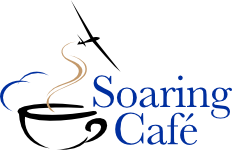
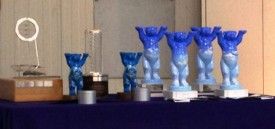
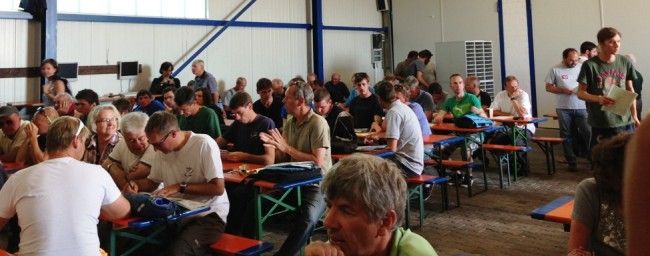
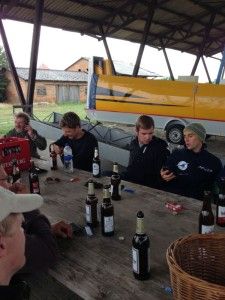
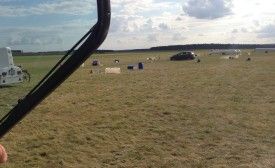
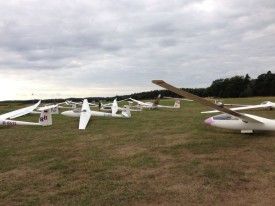
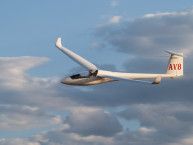
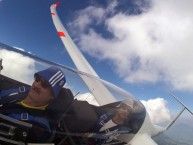
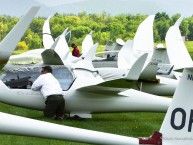
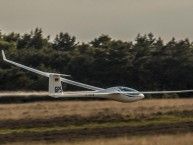
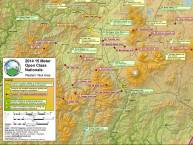
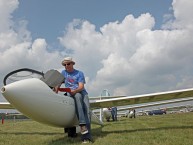
1 comment for “Impressions from the German Championships in Lüsse”